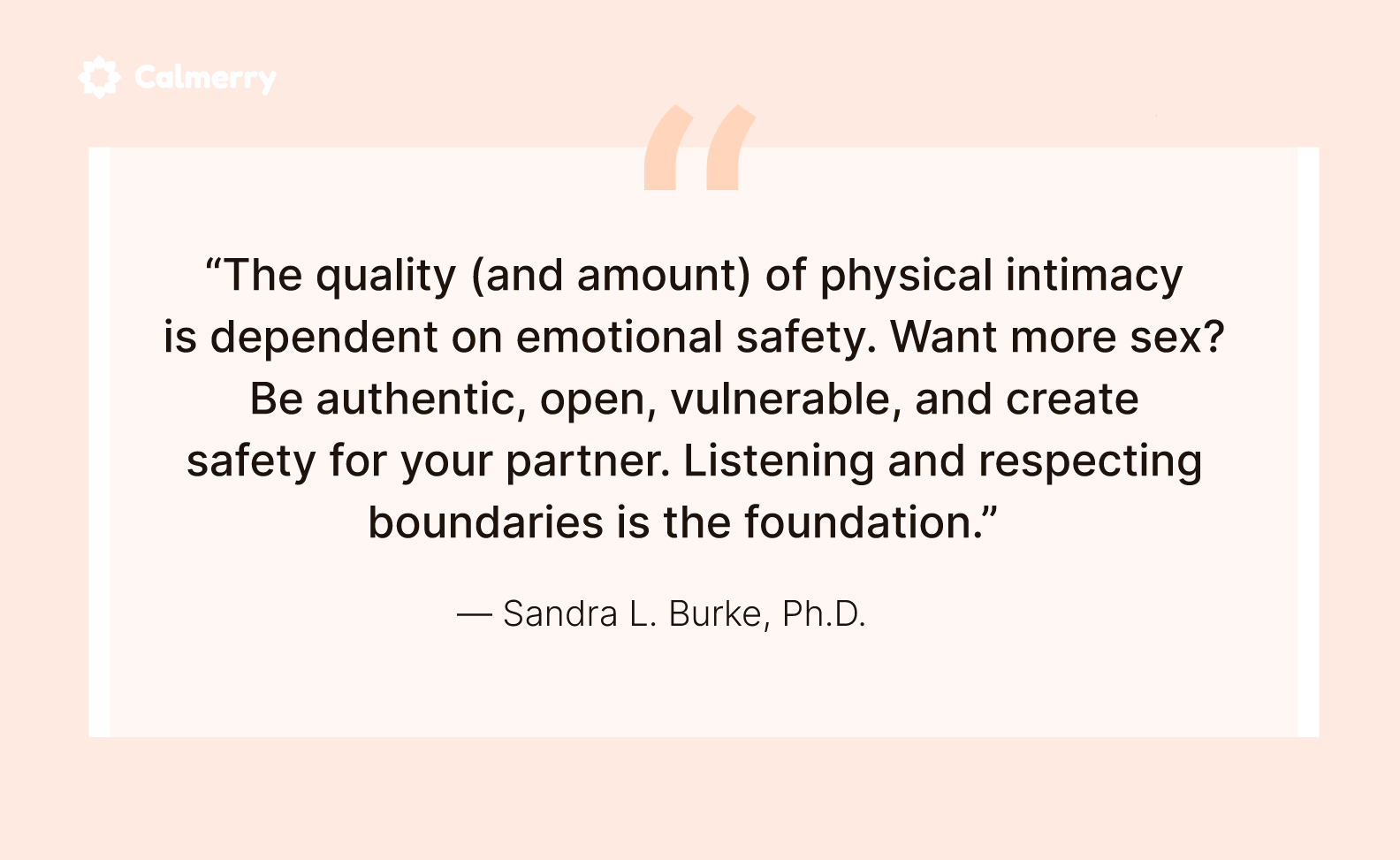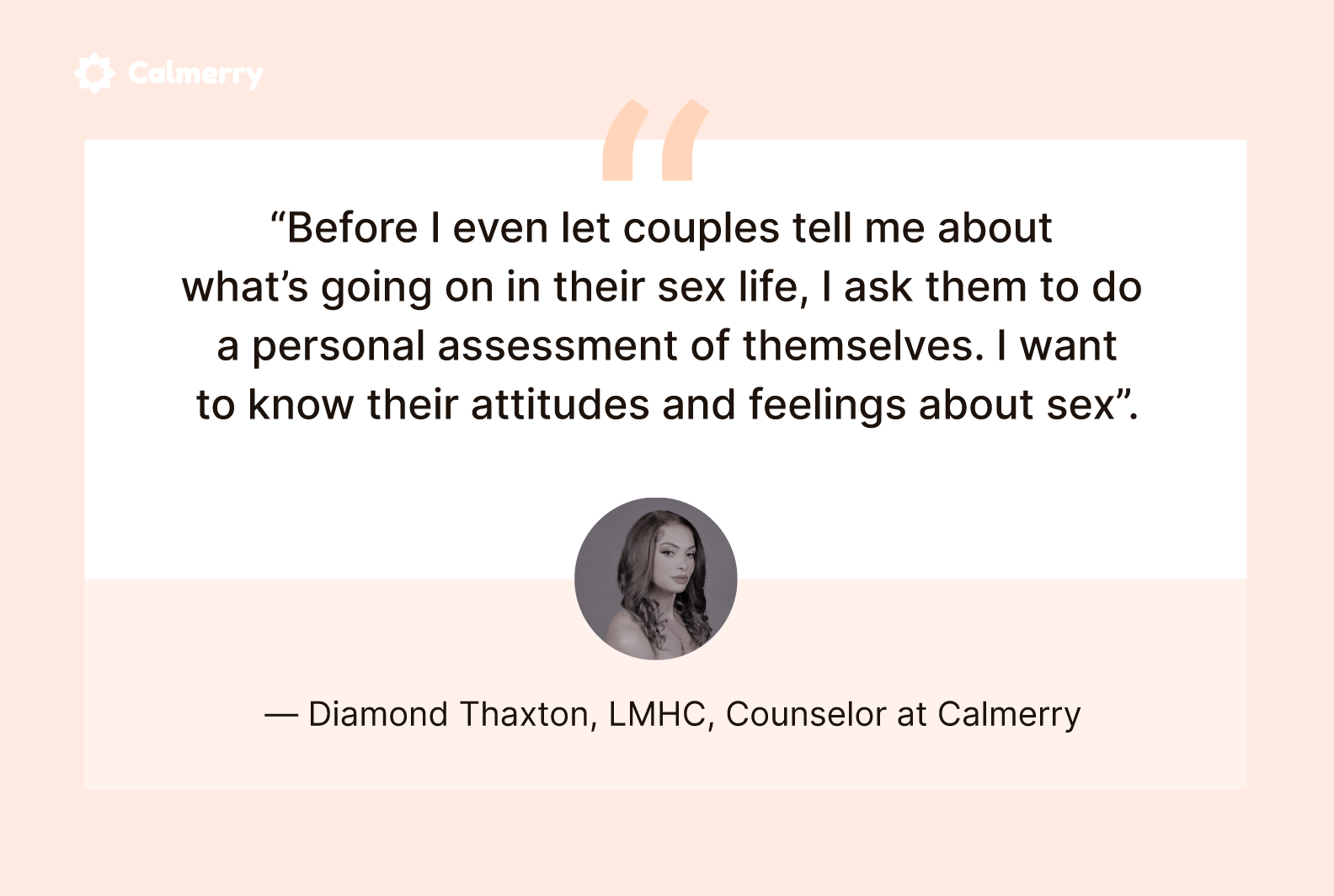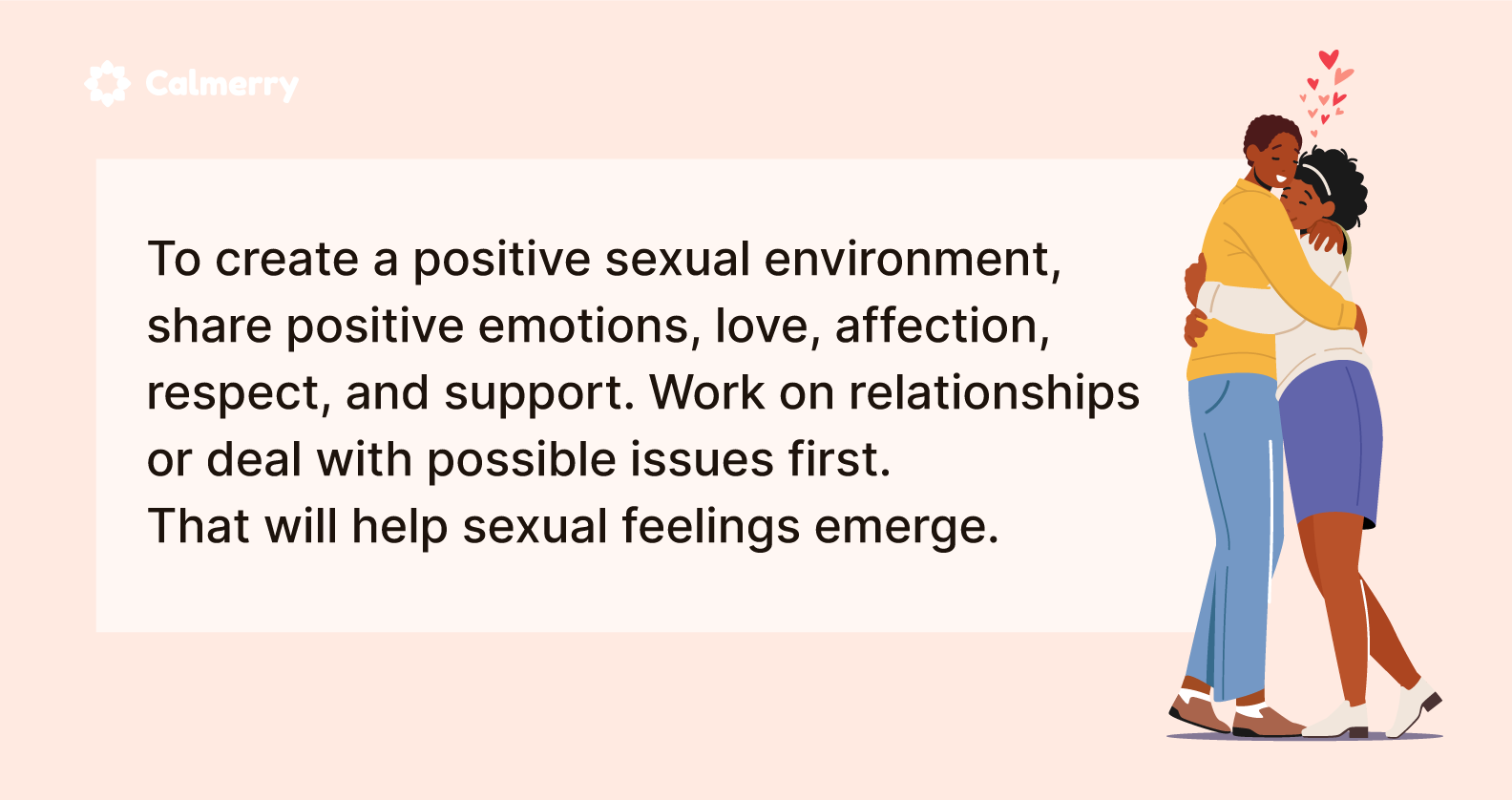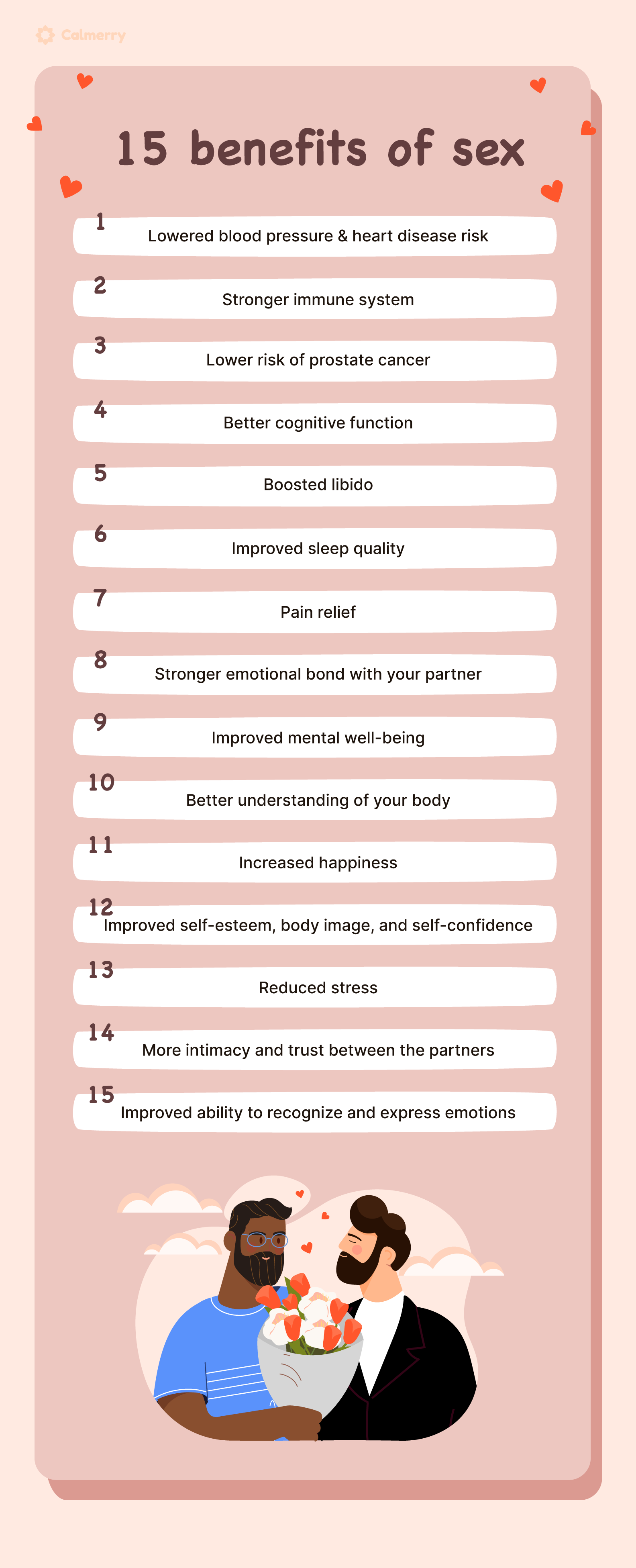How Often Do Couples in Long-Term Relationships Have Sex?

In this article
Average Frequency of Sex in Long-Term Relationships
What is the average sexual frequency that couples in lasting relationships have?
Sooner or later, people come to discuss this question, seeking the ultimate criteria and checking whether they “hit the mark.” And that’s pretty natural.
For example, Jerry and Mary had a regular, 3-days-a-week sex life in the initial stages of their relationship. Lately, their statistics have decreased to once a month, while their sexual life is still satisfactory for both.
Their relationship is still full of love and affection, but the decline in intimacy itself does worry them. They heard about the standard “once a week” and are now concerned about not being up to par with it.
“It may be that it’s not enough, and we’re not like ‘normal’ couples. Are we moving towards a breakup?”
So, Jerry and Marry and many other couples in longstanding relationships want to get answers to these common questions:
- How often do couples have physical interaction in general?
- Should there be any “gold standard”?
- Is sexual intercourse important at all?
- What can affect the amount of physical intimacy?
- Is it okay, or will it lead to relationship issues?
- How can couples improve their sex life?
If you want to get the answers, keep reading. Below, we’ll explain it all more directly, providing statistics, experts’ opinions, and helpful recommendations.
Research Findings on Sexual Activity in Long-Term Couples
It may be intriguing to look at the statistics to find out what’s going on in people’s intimate lives and how it can be measured. Here are the insights that scientific studies can provide us with:
Once a week is the average amount of sex in long-term couples
Numerous studies derived the average number of intimate courses in engaged, married, or cohabiting couples. In particular, according to a 2017 study published in the Archives of Sexual Behavior, on average, adults have erotic activities 54 times a year or about once a week. The researchers studied the sexual behavior of over 26,000 people from 1989 to 2014.
But it’s also important to note that sexual frequency is the highest during the early stages of relationships. And there are phases when couples doing it more often (for example, when partners are planning to have a baby).
The more isn’t always the better

The surveys with over 70,000 responders for the “The Normal Bar” book found that 7.5% of the people have intimate contacts daily.
Indeed, physical intimacy is associated with happiness, pleasure, and relationship satisfaction, but it doesn’t play a crucial role in this.
According to the research, sex once a week brings the same feeling of happiness as if couples had it more often. In the most fulfilling relationships, partners have as much intimate contact as they both want.
The frequency of sex in Americans declines
Interestingly, there’s a tendency for lovemaking decline in among Americans:
- People of the Silent generation (the 1930s) had intimate contact approximately 63 times per year
- For late Millennials, the frequency is 57 times for the same period
- And Gen Z is now talking about a “sex recession” as they’re having physical intimacy less often than previous generations
Also, married people had sexual activity 16 times less per year in 2010-2014 compared to 2000-2004. And it’s nine times less per year compared to 1995-1999.
This decline is connected with twin trends: a lower number of people with a steady partner and less sexual activity among them. However, the frequency is still higher for married couples than for people with no life partner. For them, it usually ranges from “weekly” to “once-a-month” statistics.
As to the present generations, there’s the “quality over quantity” tendency. It’s connected with pleasure and healthy sexual life advocacy, active sex-positivity movement, fighting the stigma and discrimination, and spreading awareness about what fulfilling relationships look like.
Sexless marriages are not uncommon
Roughly speaking, a sexless relationship is defined as a relationship with sexual activity less than 10 times a year or 1 time per month. However, the definition is not really accurate since sexual activity can involve not only sexual intercourse per se.
According to the Relationships in America survey, 12% of all married people 18-60 y.o. didn’t have physical interactions for at least 3 months.
Advanced age doesn’t mark the end of sexual life
Age has a strong effect on sexual frequency:
- Americans in their 20s have sexual intercourse about 80 times per year
- The average adult has it about 54 times
- For Americans in their 60s, the number of intimate contacts is about 20 times
However, as they say, age ain’t nothing but a number – affection doesn’t completely stop with aging. Many people over 80 are still sexually active.

Affecting Factors
Married, cohabiting, and engaged couples notice that the frequency of sex declines with time. Many are concerned and even ashamed of this fact. They tend to compare personal love lives with those of others and believe that frequency is the measure of “success.”
Besides, couples may consider this decline as one of the main reasons for the worsening of relationship quality.
The truth is, for couples in committed partnerships, there is no “normal” amount of sex they should be having. And even if there was, it would not apply to everyone. Why?
Because the answer varies and is based on several factors:
- Age
- Social environment
- Lifestyle
- The current state of physical and mental health
- Mood
- Occupation
- Each person’s desire level and sex drive
- Personal preferences and emotional needs
- Beliefs, ethics, and customs
- Impact of past experience that could cause anxiety-, stress-, or trauma-related disorders
- The overall relationship satisfaction
So, it’s impossible to follow any one-size-fits-all approach for everyone. There’s no right answer or an ideal number of times per week, month, or year.
Some couples make the mistake of focusing too much on numbers, thus checking whether their sex life is okay. Statistics are misleading.
When people try to check the box, pushing sexual frequency to match some “ideal number” to be good enough, they make their lovemaking performative. It becomes a daily chore rather than a special experience.
To evaluate the level of satisfaction with sex lives and relationships, couples should stop focusing on the numbers and start paying more attention to what they experience far beyond the bed.
What Are the Benefits of an Active Sex Life?
Understanding that being physically close with someone is a natural and important part of our life and well-being is one of the aspects of sexual health. Sexual health goes far beyond just sexual behavior and satisfaction. It involves:
- High awareness and free access to sexual health education
- The ability to discuss it with your partner and healthcare professionals
- Getting needed medical treatment and care
- Feeling safe, confident, and respected, while being vulnerable
- The ability to enjoy sexuality and experience contentment on physical and psychological levels, etc.
For people in healthy sexual relationships, lovemaking is not just a way to satisfy their physical needs but also a powerful emotional connector. They can freely discuss all sides of intimate life, including their desires, fantasies, concerns, frequency of intercourse, etc.
Such couples have the key to healthy relationships and the emotional, mental, and physical benefits of physical connection. Here are just a few of them:
- Lowered blood pressure & heart disease risk
- Stronger immune system
- Lower risk of prostate cancer
- Better cognitive function
- Boosted libido
- Improved sleep quality
- Pain relief
- Stronger emotional bond with your partner
- Improved mental well-being
- Better understanding of your body
- Increased happiness
- Improved self-esteem, body image, and self-confidence
- Reduced stress
- More closeness and trust between the partners
- Improved ability to recognize and express emotions

Should Couples Be Planning Sex?
From a health perspective, having a regular sexual schedule can be beneficial for many couples. Planning sexual activities doesn’t mean it becomes mechanical or loses spontaneity. Rather, it ensures that lovemaking remains a priority in busy lives.
Scheduling intimate sessions can actually:
- Create anticipation and excitement
- Reduce pressure to initiate
- Ensure both partners are mentally prepared
- Help balance different desire levels
- Make sex a priority rather than an afterthought
Many sexual health therapists recommend planning intimate time, especially for couples with busy schedules, young children, or mismatched libidos. Scheduling doesn’t mean physical intercourse becomes less passionate – it simply means you’re making your relationship a priority.
However, scheduling works best when couples remain flexible and communicate openly about their needs. The goal isn’t to create another obligation but to carve out protected time for connection.
A couple should have sex when both partners desire it, not because a calendar dictates it. The quality of the experience matters more than adhering strictly to a schedule.
What to Do If One Partner Has a Higher Sex Drive Than the Other?
Mismatched libidos are one of the most common challenges couples face. When one partner wants sex more often than the other, it can create tension, feelings of rejection, or pressure.
Here are strategies for navigating different desire levels:
- Open communication is essential. Talk honestly about needs without blame or shame
- Focus on intimacy, not just physical intercourse. Find other ways to maintain physical connection
- Explore the reasons behind lower desire. It may be stress, health issues, medication, or relationship problems
- Consider compromise. Find a frequency that feels manageable for both partners
- Seek professional guidance. A sex therapist can help couples understand and bridge differences in desire
Remember that desire levels naturally fluctuate throughout life and relationships. The partner who wants sex less often isn’t “wrong,” just as the partner who wants more sex isn’t being “unreasonable.”
Finding balance requires mutual respect, understanding, and sometimes creative solutions that satisfy both partners’ needs for connection.
Myths vs. Reality
The Misconception That Passion Always Declines Over Time
Many believe that passion inevitably fades in long-term relationships, but research shows this isn’t always true. While some couples experience a natural decline in sexual frequency, others maintain active sex lives throughout decades together. The key difference? Couples who maintain passion often:
- Continue to prioritize intimacy and connection
- Don’t take each other for granted
- Make conscious efforts to keep romance alive
- View their relationship as continuing to evolve
Passion can actually deepen over time as partners develop greater intimacy and understanding of each other’s needs.
The Pressure of Societal Expectations and Comparison to Other Couples
In the age of social media and unrealistic portrayals of relationships in media, many couples feel pressure to compare their sex lives to others.
This comparison can be damaging because:
- What works for one couple may not work for another
- People rarely share the complete truth about their intimate lives
- External standards ignore individual preferences and circumstances
Every couple has a sexual connection at their own rhythm that works for their unique relationship. The frequency that brings satisfaction to one couple may be too much or too little for another.

Understanding That Frequency Does Not Always Reflect Relationship Quality
Here’s what Sandra L. Burke, Licensed Clinical Psychologist, says on this point:
“The quality (and amount) of physical intimacy is dependent on emotional safety. Want more sex? Be authentic, open, and vulnerable, and create safety for your partner. Listening and respecting boundaries is the foundation.”
Emotional safety is necessary for creating emotional and physical intimacy within a relationship. It’s the stable sense of emotional closeness to your loved one and mutual care for each other’s well-being.
According to research published in 2017, a warm interpersonal climate between spouses and satisfying sex life matter more for marital satisfaction than the frequency of sexual intercourse. [2] Healthshots. (n.d.). Sexual health, sex intimacy, sexual health tips, tips to improve your sex life. https://www.healthshots.com/intimate-health/sexual-health/
So, if the overall feeling between partners is not positive, physical connection won’t necessarily translate into high satisfaction with the relationship. Thus, the frequency should not be the main goal.
Having sex once a week just to shoot the number is not an effective strategy to keep the fire alive. Instead, prioritizing the happiness, comfort, emotional intimacy, feelings, and the best mental and physical well-being of both partners – it’s what matters to improve the quality of sex life and make the relationship strong.
After all, it’s not all about sex. There are many other ways to fulfill your intimacy needs physically and emotionally.
And it would be safe to say that if you have sex once a month or 2 times a day with your partner, it doesn’t make your relationship better or worse. If it 100% works for you both, you’ve found your ideal frequency, whatever the average is. If not, there are ways to work on the problem.

How to Maintain a Healthy Sex Life in a Long-Term Relationship
Open Communication About Needs and Desires
The foundation of a healthy sex life is honest, respectful communication. Partners should feel safe discussing:
- What they enjoy sexually
- How often they’d like to have sex
- Any changes in their desires over time
- Fantasies they’d like to explore
- Physical or emotional barriers to intimacy
Regular check-ins about sexual satisfaction help prevent small issues from becoming major problems. A therapist can facilitate these conversations if they feel difficult.
After all, it’s not all about sex. There are many other ways to fulfill your intimacy needs physically and emotionally.

Prioritizing Intimacy Despite Busy Schedules
In today’s fast-paced world, intimacy often takes a backseat to work, childcare, and other responsibilities. Couples who maintain satisfying sex lives:
- Make their relationship a priority
- Create boundaries around work and technology
- Spend quality time together regularly
- Find ways to connect throughout the day
- Consider scheduling intimate time if spontaneity is difficult
Remember that intimacy isn’t just about sex – it’s about maintaining emotional connection through everyday actions.
Trying New Experiences to Keep the Spark Alive
Over time, sexual routines can become predictable. Couples who maintain passion often:
- Remain curious about each other
- Try new activities together (both in and out of the bedroom)
- Discuss and explore fantasies when appropriate
- Create opportunities for novelty and excitement
- Focus on pleasure rather than performance
Adding variety doesn’t require dramatic changes-even small adjustments to routine can reignite interest.

Seeking Professional Guidance If Needed
Sometimes couples need additional support to navigate sexual challenges. A sex therapist can help with:
- Communication difficulties around intimacy
- Mismatched desire levels
- Physical issues affecting sexual function
- Past trauma affecting current sexuality
- Finding ways to reconnect after major life changes
Seeking help isn’t a sign of failure-it’s a commitment to the relationship’s health and longevity.
Conclusion
In the end, how often people share physical closeness in enduring love varies widely. The most important factor isn’t matching some statistical average but finding a frequency that satisfies both partners.
What matters most in a relationship isn’t the number of sexual iterations, but the quality of their connection, both in and out of the bedroom. Emotional intimacy, mutual respect, and open communication create the foundation for a satisfying sex life, regardless of frequency.
Remember that desire naturally ebbs and flows throughout a relationship. Life circumstances, health issues, stress, and aging all affect sexual frequency, and these changes are normal. If you’re concerned about your sex life, focus less on comparing yourself to others and more on:
- Communicating openly with your partner
- Prioritizing quality connection
- Understanding each other’s needs
- Creating emotional safety
- Seeking help when needed
You deserve a healthy and fulfilling sex life that works for your unique relationship.

FAQ
How often do most couples in long-term relationships have sex?
Research shows that, on average, long-term partners have sex about once a week. However, this varies widely among couples, with some having sex several times a week and others much less than three times per month. What matters most is finding a number of times a couple would be mutually satisfied and agree on.
Does sexual frequency naturally decrease over time?
While many couples experience a decrease in sexual frequency over time, this isn’t universal. The initial “honeymoon phase” often includes more frequent sex, which typically stabilizes over time. However, with continued effort and communication, many couples maintain satisfying sex lives throughout their relationship.
What factors affect a couple’s sex life in a long-term relationship?
Many factors influence how often couples have sex, including:
- Age and health status
- Work and family responsibilities
- Stress levels
- Relationship satisfaction
- Past sexual experiences
- Hormonal changes
- Medication side effects
- Individual desire levels
- Communication quality
- Physical and emotional intimacy
Is there a “normal” amount of sex for a healthy relationship?
There is no “normal” amount or magic number that applies to all couples. What matters is finding a frequency that satisfies both partners’ needs for intimacy and connection. Some couples are content with sex a few times a month, while others prefer multiple times per week. The key is compatibility and communication.
How can couples maintain intimacy and passion over the years?
Maintaining intimacy requires ongoing effort from both partners:
- Prioritize quality time together
- Communicate openly about desires and needs
- Try new experiences together
- Address problems promptly
- Focus on emotional connection
- Make sex a priority, not an afterthought
- Support each other through life changes
- Seek professional help when needed
Is it normal or healthy for couples to have sex every day?
From a health perspective, having sex every day is perfectly healthy as long as both partners desire it. According to surveys, only about 4% of Americans have sex daily. While daily sex works for some couples, frequency isn’t as important as mutual satisfaction. Quality generally matters more than quantity.
Does having less sex than usual mean people are not happy in their relationship?
Not necessarily. Many happy couples have less frequent sex due to life circumstances like busy schedules, health issues, or childcare responsibilities. What matters more is whether both partners feel their needs are being met. If the decline causes distress for either partner, it may be worth exploring the reasons and finding solutions.
What is the normal sex frequency by age?
Although we cannot define ‘normal’ frequency of physical intercourse, we could use research stats that indicate that sexual frequency tends to decline with age.
While people in their 20s do it about 80 times in a year, the number of physical contacts declines to less than 20 times in the 60+ age group.
However, many people maintain active sex lives well into their 80s. Age alone doesn’t determine sexual frequency or satisfaction.
What is a healthy sex life?
A healthy sex life is one where:
- Both partners feel satisfied with the quality and frequency
- Sex is consensual and pleasurable for both people
- Communication about desires and boundaries is open
- Neither partner feels pressured or rejected
- Physical and emotional intimacy are balanced
- Partners can adapt to life’s changes together
The definition of a “healthy sex life” varies for each couple and may change throughout different life stages
Schick, V., Herbenick, D., Reece, M., Sanders, S. A., Dodge, B., Middlestadt, S. E., & Fortenberry, J. D. (2010). Sexual behaviors, condom use, and sexual health of Americans over 50: Implications for sexual health Promotion for Older adults. The Journal of Sexual Medicine, 7(Supplement_5), 315–329. https://doi.org/10.1111/j.1743-6109.2010.02013.x
Healthshots. (n.d.). Sexual health, sex intimacy, sexual health tips, tips to improve your sex life. https://www.healthshots.com/intimate-health/sexual-health/
online therapy
live video session


